The 51st Session of the Human Rights Council
12 September – 7 October 2022
Agenda Item 10: Technical assistance and capacity-building
Interactive Dialogue on the oral update of the Office of the High Commissioner for Human Rights on technical assistance and capacity building for South Sudan
5th October 2022
By Natalia Venegas / GICJ
Executive Summary
South Sudan's transitional justice process has been delayed. On the 5th of October 2022, during the 51st Session of the Human Rights Council, the Council held an interactive dialogue on technical assistance and capacity building, where this issue was raised.
The Director of the Field Operations and Technical Cooperation Division at the Office of the High Commissioner for Human Rights, Mr. Christian Salazar Volkmann, presented a report on the updated human rights situation in South Sudan. This report outlined some of the key human rights challenges faced by South Sudan and explained some of the measures of assistance that have been provided. For instance, there were training sessions delivered regarding human rights law and international humanitarian law, conflict-related sexual violence and South Sudan’s Police Force Act from 2009, as well as the rights of suspects during arrests and investigations. He also pointed out that there has been a decrease in the number of individuals affected by violence compared to previous years. However, he said that the Office of the High Commissioner for Human Rights remains concerned by the pervasive high levels of local violence and increased conflict-related sexual violence. Finally, he stated that the Office, among other parties, is implementing a joint project called “Building Peace Through Promoting Inclusive and Participatory Transitional Justice Processes and Mechanisms in South Sudan”. The project supports the creation of the Truth and Reconciliation Healing Commission, following chapter V of the Revitalized Agreement. It was accompanied by a Reparation Authority and the Hybrid Court. These mechanisms are in accordance with the recommendations given during the UPR of South Sudan and in conjunction with the assistance provided by the Office of the High Commissioner and relevant bodies. The Director said the Office of the High Commissioner recognises and commends the progress made by the Government of South Sudan.
On behalf of the country concerned, the representative of South Sudan indicated his government’s commitment to fully implementing the Revitalized Agreement but stated that there should be more time to implement the Revitalized Agreement. He stated that the graduation of more armed forces would strengthen the capacity for protecting and promoting human rights through enhancing accountability and putting an end to inter-communal violence in the country. To this end, the representative of South Sudan highlighted that the President has created a National Human Rights Council to conduct public awareness, advocacy, monitoring investigations, and provide advice to address human rights violations.
Other delegations present showed concern over the ongoing grave human rights violations in South Sudan, especially sexual violence during the conflict. They also called for the transitional justice mechanisms of the peace agreement to be fully established and adequately funded.
Geneva International Centre for Justice (GICJ) is concerned about the persistent violence, especially sexual violence. GICJ delivered two joint statements during this interactive dialogue to express these concerns. The Government of South Sudan must demonstrate its willingness to end human rights violations and bring perpetrators to justice. Transitional justice in South Sudan should not be postponed. It is paramount that all critical elements of the Revitalized Agreement be implemented, including the Hybrid Court and the Commission. The Office of the High Commissioner and the international community must continue to provide technical support and capacity-building to South Sudan to consolidate its legal and security institutions.
Background
The Human Rights Council adopted Resolution A/HRC/RES/49/35 on the 1st of April 2022. In the Resolution, the Council showed concern about the human rights situation in South Sudan. However, the Resolution also welcomed the steps taken by the government to finalise government structures under the Revitalized Agreement on the Resolution of the Conflict in the Republic of South Sudan. The Resolution expressed the Council’s praise regarding the will of the government to improve justice by establishing a court for cases of gender-based violence. They also proposed mobile military courts to prosecute offences committed against civilians by members of the organised forces while on duty. The Resolution also recalled the relevant decisions of the African Union and the Intergovernmental Authority on Development, as well as the decisions and communications made by the Security Council to accelerate the establishment of transitional justice mechanisms.
Furthermore, the Council emphasised the need to ensure women's meaningful participation during the Agreement's future stages. It highlighted the importance of States in promoting and protecting human rights violations and providing a remedy for the victims. But, the Resolution also pointed out the challenges that the government of South Sudan faced regarding technical assistance and capacity building and called upon the international community to provide technical and financial assistance to South Sudan to further improve the situation of human rights.
Summary of the UN Report
Mr Christian Salazar Volkmann, Director of the Field Operations and Technical Cooperation Division at the Office of the High Commissioner for Human Rights, discussed the report on the updated human rights situation in South Sudan. From January to August 2022, capacity-building measures and technical assistance were provided to South Sudan, and training was delivered to police officers and government forces. This training included education on human rights law and international humanitarian law, conflict-related sexual violence and South Sudan’s 2009 Police Force Act, as well as the rights of suspects during arrests and investigations.
Further, there was also training on human rights for customary courts involving the High Court of Justice, with 154 participants, including Magistrates and Prosecutors, of whom 61 were women. The training taught them how to work with human rights violations.
It is essential to highlight that there has been a decrease in the number of individuals affected by violence compared to the previous years. However, the Office of the High Commissioner for Human Rights remains concerned by the pervasive high levels of local violence and increased conflict-related sexual violence. In this regard, it is essential to expand the capacity of the State and civil society to report on conflict-related sexual violence. The report called for the immediate cessation of all parties to the conflict of sexual violence.
Additionally, the parties have agreed to implement the Revitalized Agreement over the next 24 months and to draw a new road map. The report mentioned that as part of the transitional justice process, the Office, among other parties, is implementing a joint project called “Building Peace Through Promoting Inclusive and Participatory Transitional Justice Processes and Mechanisms in South Sudan”. This project supports the creation of the Truth and Reconciliation Healing Commission, following chapter V of the Revitalized Agreement and was accompanied by a Reparation Authority and the Hybrid Court. These mechanisms are in accordance with the recommendations given during the UPR of South Sudan.
Interactive dialogue
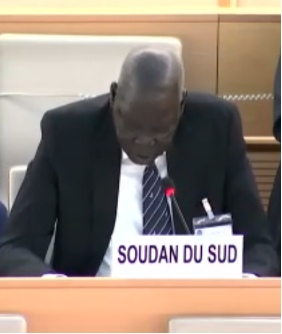 The delegate of South Sudan indicated that there have been challenges regarding a lack of financial resources. Also, the government has new programs to train police officers and members of the armed forces, which would involve new security arrangements. These graduated forces will strengthen the capacity for protecting and promoting human rights through enhancing accountability and putting an end to inter-communal violence in the country. To this end, he highlighted that the President has created a National Human Rights Council to conduct public awareness, advocacy, monitoring investigations and provide advice to address human rights violations.
The delegate of South Sudan indicated that there have been challenges regarding a lack of financial resources. Also, the government has new programs to train police officers and members of the armed forces, which would involve new security arrangements. These graduated forces will strengthen the capacity for protecting and promoting human rights through enhancing accountability and putting an end to inter-communal violence in the country. To this end, he highlighted that the President has created a National Human Rights Council to conduct public awareness, advocacy, monitoring investigations and provide advice to address human rights violations.
He also discussed how the Ministry of Justice created a technical committee which conducted a consultation throughout the country. The committee delivered its report, which the Ministry is using to draft a project for future legislation. He also stated that the Ministry is drafting a bill to establish the bases of compensation and reparation authority. Moreover, the government is also consulting with the African Union to establish a Hybrid Court.
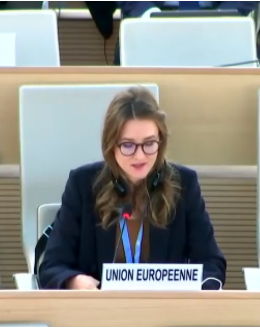 The delegate of the European Union then took the floor. She stated concern about the ongoing grave human rights violations in South Sudan. She also regretted the lack of progress made so far in the state. Specifically, the delegate reported widespread and systematic sexual and gender-based violence perpetrated by national security forces against civilians as appalling. She closed by highlighting that the extension of the transitional governance arrangements, postponing elections until late 2024, should be used to shape the electoral system and create a conducive environment for a peaceful and stable South Sudan.
The delegate of the European Union then took the floor. She stated concern about the ongoing grave human rights violations in South Sudan. She also regretted the lack of progress made so far in the state. Specifically, the delegate reported widespread and systematic sexual and gender-based violence perpetrated by national security forces against civilians as appalling. She closed by highlighting that the extension of the transitional governance arrangements, postponing elections until late 2024, should be used to shape the electoral system and create a conducive environment for a peaceful and stable South Sudan.
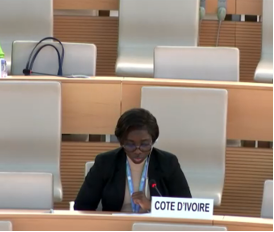 Further, the delegate of the Ivory Coast spoke on behalf of a Group of African States. She called upon the Office of the High Commissioner to work with the government of South Sudan regarding technical assistance and to strengthen technical capacity. She also urged the Office to address those specific areas in which technical capacity is needed.
Further, the delegate of the Ivory Coast spoke on behalf of a Group of African States. She called upon the Office of the High Commissioner to work with the government of South Sudan regarding technical assistance and to strengthen technical capacity. She also urged the Office to address those specific areas in which technical capacity is needed.
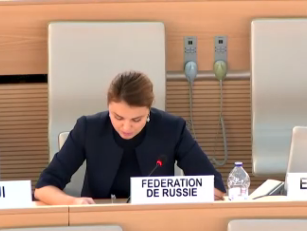 The delegate of the Russian Federation stated that capacity building should always be done with the consent of the country concerned. She also congratulated the government of South Sudan for the improvements made, human rights achievements, and state-building undertaken. She stated that the Russian Federation supports the extension of the transitional period.
The delegate of the Russian Federation stated that capacity building should always be done with the consent of the country concerned. She also congratulated the government of South Sudan for the improvements made, human rights achievements, and state-building undertaken. She stated that the Russian Federation supports the extension of the transitional period.
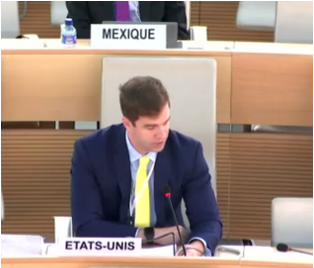 In addition, the delegate of the United States condemned any attacks against civilians. He called for the transitional justice mechanisms of the peace agreement to be fully established and adequately funded. He said that the people of South Sudan should have an opportunity to participate in an inclusive constitution-drafting process and free and fair elections. He called for effective anti-corruption mechanisms to be implemented to prevent the ongoing looting of the country’s wealth.
In addition, the delegate of the United States condemned any attacks against civilians. He called for the transitional justice mechanisms of the peace agreement to be fully established and adequately funded. He said that the people of South Sudan should have an opportunity to participate in an inclusive constitution-drafting process and free and fair elections. He called for effective anti-corruption mechanisms to be implemented to prevent the ongoing looting of the country’s wealth.
The delegate of Sudan highlighted South Sudan's will to implement the rule of law, despite the challenges. He explained how the state is committed to implementing the Revitalized Agreement and transitional justice process in the brother nation. Nevertheless, he stated the importance of territorial integrity and the respect the international community should give to the country's concerns.
Concluding Remarks
The Director highlighted the importance of the government's implementation of the Revitalized Agreement with the help of regional and international actors. He also pointed out the importance of security and accountability for the country's transitional justice process and long-lasting peace. The government has taken action to implement legislation regarding this topic and to enforce accountability in a better way. Furthermore, the importance of the support of the African Union was raised as how they are a key actor in the development of the hybrid court.
He also pointed out the requirement to respect sovereignty and stated that the government of South Sudan had requested technical assistance and capacity building, so the first step was mapping the need for support. And in that sense, the Office will keep providing financial and technical support to the Ministry of Justice in drafting the legislation act on the Truth, Reconciliation and Healing Commission. As well as firmly advocating for establishing a hybrid court and the participation of victims at every step of the accountability process.
Position of Geneva International Centre for Justice
GICJ welcomes the update provided by the Office of the High Commissioner for Human Rights. We remain concerned about the high rates of violence within the country, especially regarding sexual violence. The Government of South Sudan must demonstrate its willingness to end human rights violations and bring perpetrators to justice. Transitional justice in South Sudan should not be postponed. It is also paramount that all critical elements of the Revitalized Agreement be implemented, including the Hybrid Court and the Commission. The Office of the High Commissioner for Human Rights and the international community must continue to provide technical support and capacity-building to South Sudan to consolidate its legal and security institutions.
During the meeting, GICJ delivered two oral statements. In a joint statement with Meezaan Center for Human Rights, GICJ stated that these crimes must be condemned because they expose a systemic pattern of continued impunity. Holding credible trials and establishing mechanisms to ensure truth-telling, reparations, and justice for the victims is essential in repairing the country's social fabric and bringing healing to the people. Furthermore, in a joint statement with EAFORD, it was highlighted that GICJ is troubled by the Government's failure to date to establish a Hybrid Court for South Sudan.
Technical Assistance, Capacity Building, Interactive Dialogue, South Sudan, HR51, United Nations, Human Rights, GICJ, Geneva International Centre for Justice, Geneva4Justice, Justice









